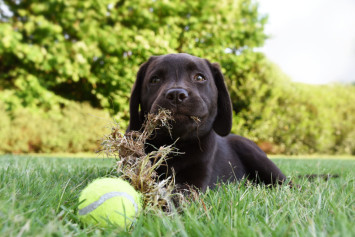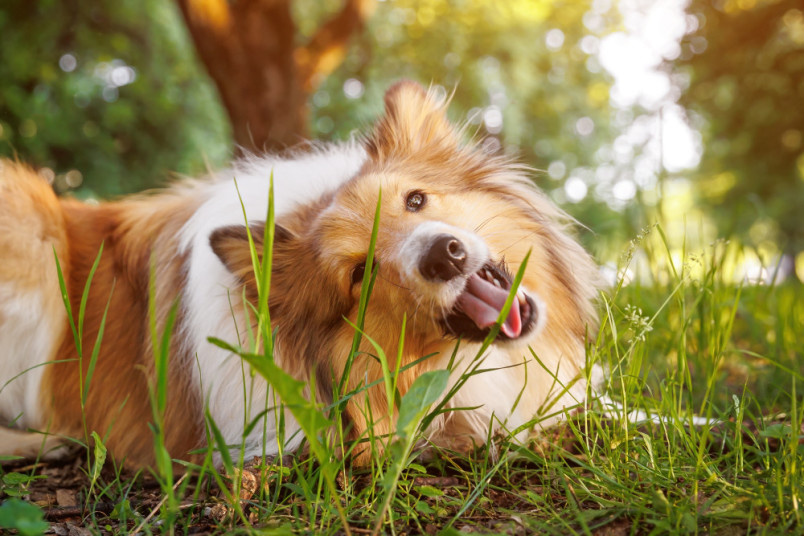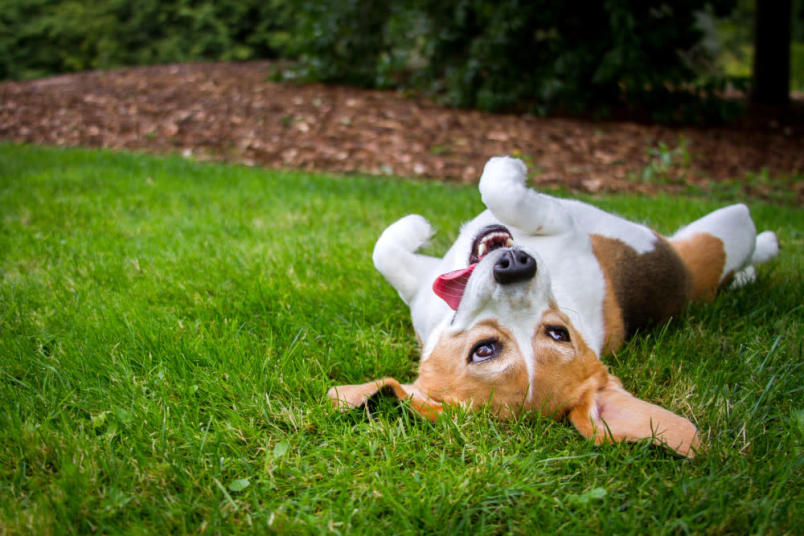
Dogs are interesting creatures. As pet owners we observe our dogs performing behaviors that may leave us scratching our heads from time to time. This could include things like rolling around on their back, scooting their rear across the carpet, or even eating grass. The world of canine behavior is a fascinating one, filled with seemingly odd quirks. While eating grass might appear innocent, the question remains: is there more to the story? Could this habit be a harmless eccentricity or a hidden clue to a deeper issue?
Can Dogs Eat Grass?
Pica is the medical term for the act of eating things that are not considered food. It is extremely common for dogs to eat grass on occasion, and in moderation, it does not have to be a big deal. Let’s explore some potential reasons for this common behavior.
Why is My Dog Eating Grass?
It is normal for a dog to chew on or ingest grass from time to time. Especially in young pups, this can be a way to explore and learn about their environment. Think about how human babies put everything in their mouth to experience their surroundings. Our pups do the same. They love to experience new tastes and textures, and some dogs may just find the taste of grass appealing. Imagine the vibrant green blades of grass tickling your dog's nose as they explore the fascinating world beneath their paws. The scent, the texture, the taste - all part of their adventurous journey through the backyard jungle.
Dogs may also choose to eat grass as a form of entertainment secondary to boredom or hunger. Imagine your dog stuck at home all day, bored out of their minds. They haven't had a walk, haven't played fetch, and their brain is craving stimulation. What's a bored dog to do? Well, munching on some grass might just be the most exciting thing happening in their world right now.
Providing exercise and enrichment such as playtime with other dogs, going for a walk or playing fetch prior to leaving your pet outside for an extended period will help decrease boredom, and in turn can reduce the frequency of grass eating. Mental stimulation and engagement are very important to a dog’s well-being.

Does Eating Grass Cause Stomach Upset in Dogs?
Besides eating grass for more benign reasons, dogs can also eat grass in cases of upset stomach or nutritional deficiencies. Many people think dogs eat grass to help soothe their stomach as it causes them to vomit. If only we could read out dog’s minds. Less than 25% of dogs vomit after eating grass, so it is uncertain if this is their motive, or if the act of eating grass itself may soothe the stomach as it can make the pH level less acidic and provide relief. If your dog is eating grass and vomiting afterwards, try to prevent the behavior, and if the stomach upset continues you should schedule a checkup with your pet’s veterinarian.
Is My Dog Eating Grass Due to a Nutritional Deficiency?
If your dog is regularly insisting on ingesting grass or soil and it does not seem to be related to incidents of stomach upset or boredom, your pet could be experiencing a nutritional or fiber deficiency. This should prompt you to consult with your veterinarian to rule this out. If your pup is craving some extra roughage, consider supplementing their diet with fruits and vegetables that are safe for your pup, such as pumpkin, carrots, or apples. Increasing fiber intake can also help with dog constipation, a common issue that may lead to digestive discomfort. They'll be thrilled with this tasty treat! You can also consider switching to a high-fiber kibble.
If there is a true lack of vitamins or minerals in your dog’s diet, then you may need to switch your dog to a complete and balanced diet. Deficiencies are most common when owners try to make homemade meals for their dog, but can occur with certain medical conditions as well. If you are considering making your dog’s food at home, you should consult with a veterinary nutritionist first to ensure your pup is getting all the nutrients they need.
What are the Effects of My Dog Eating Grass?
If your pup eats too much grass it can cause stomach upset. In mild cases this may just cause nausea, while some dogs may even vomit or develop diarrhea. Why is my puppy throwing up, you may ask? Grass, especially in larger quantities, is irritating to the stomach lining. Dogs are not able to digest grass very well and sometimes it will even pass through in their stool intact. You may wonder how to help a dog with diarrhea if this happens in your pup. For mild cases of diarrhea, you can try fasting your dog for 12 hours, feeding a bland diet such as boiled chicken and rice for a couple days, or giving a fiber supplement, like pumpkin puree.
When Do I Need to Take My Dog to the Vet?
It is important to monitor symptoms such as vomiting and diarrhea very closely as they can cause dehydration if not corrected promptly. If your pet has been vomiting or having diarrhea for more than 48 hours, it is important to take them to see their vet.
Persistent vomiting or diarrhea can be due not only to eating grass, but sometimes to underlying health issues such as pancreatitis, foreign body ingestion and obstruction, or intestinal parasites. If not treated appropriately and promptly, your pet’s health can decline quickly. Having dog health insurance is a great way to protect your pet in the unfortunate event they need intensive care. Embrace provides protection covering up to 90% of your pet’s medical bills in the event of illness allowing you to feel safe knowing you can afford necessary diagnostics and treatments for your fur baby.
Preventing and Managing Grass Eating Behavior
Keeping your canine companion engaged, busy and well-fed will help to combat the boredom and hunger that can be associated with increased grass consumption.
Do you ever wonder if your dog's diet is providing them with all the nutrients they need? A well-balanced, high-quality diet is essential for their overall health and well-being. If you notice your pup showing an increased interest in grass, it could be a sign that something in their current food isn't quite hitting the spot. Consider trying a high-fiber dog food, as that could be what their system is trying to supplement. Have a chat with your veterinarian about choosing the right diet for your furry friend and watch their tail wag with renewed energy!
If your furry friend enjoys a tasty grass snack now and then, it's crucial to take extra precautions when treating your lawn with pesticides. Always follow the instructions on your chosen product, including application amounts and drying times. This helps ensure the pesticide has fully dried before your pet ventures out and prevents them from accidentally ingesting any harmful chemicals. Remember, a little caution goes a long way in keeping your lawn healthy and your beloved pet safe!

How to Combat Boredom
Many dogs would play with us all day long if we had the time. Certain ages and breeds need even more stimulation than others. When you catch your pet eating grass, exchange it for a toy or distract them from the behavior. Engaging your pet in interactive games such as fetch, or tug-o-war helps strengthen your bond and keeps your fur baby satisfied.
Leaving your furry friend home alone for extended periods can be tough. They can get bored and anxious, leading to grass-eating behavior. Luckily, there are ways to keep them occupied and stimulated while you're away. Give that sweet pup some new activities! This could include a durable chew toy your pet enjoys, or a puzzle toy. Puzzle toys allow you to hide tasty treats in a toy that your pup then has to figure out how to retrieve.
If you are still having trouble managing your pet’s grass consumption, consult with your veterinarian to receive guidance on management strategies and identification of any potential underlying health issues.
Why Dogs Eat Grass
There are many potential underlying reasons for your dog to eat grass. Owners can address issues such as boredom and exploration at home, while some causes of grass consumption, such as stomach upset or dietary deficiencies may result in the need to schedule a visit with your pet’s veterinarian. In moderation eating grass is not a big deal, but it is important to monitor your pet’s grass intake to ensure that it is not excessive, requiring management measures be taken.
While some dogs enjoy the occasional "salad," if your pup's turning into a lawnmower, it might be time to dig deeper into the cause. By being observant, understanding the potential causes, and consulting your veterinarian when needed, you can help your furry friend maintain a happy and healthy life.